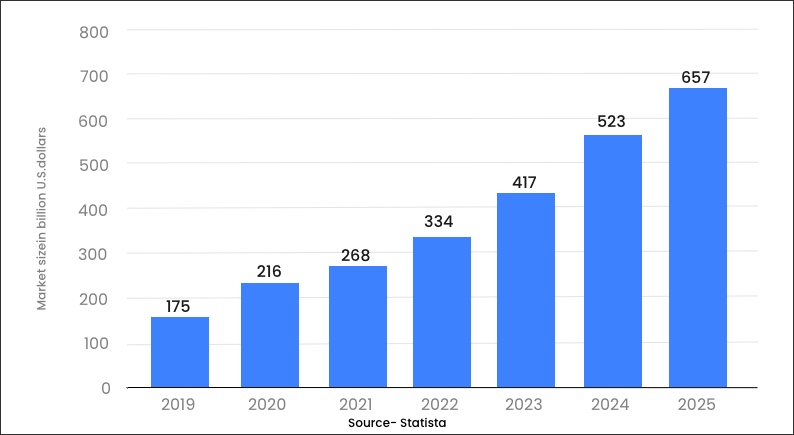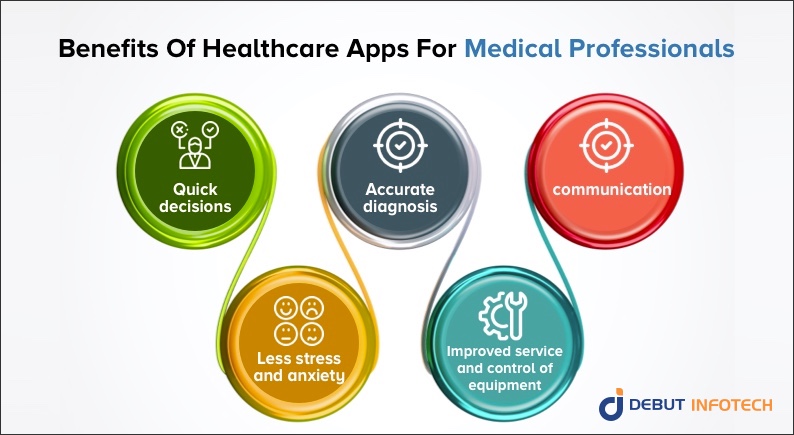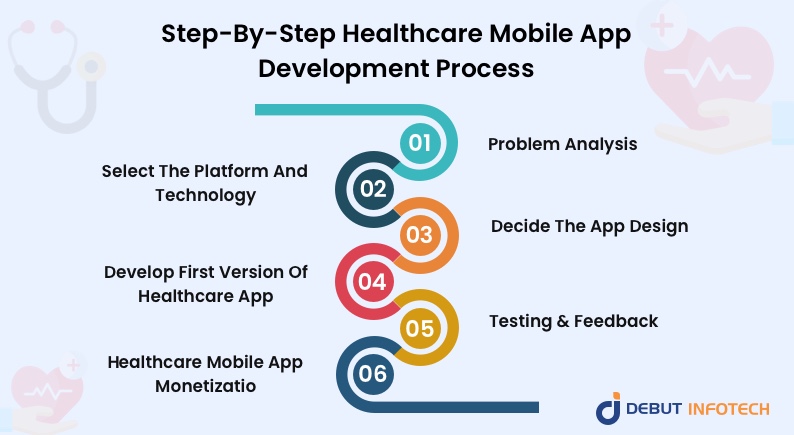Table of Contents
Home / Blog / Mobile Development
The Ultimate Guide: Healthcare Mobile App Development
August 4, 2023

August 4, 2023
Healthcare innovation is occurring at an extremely high speed. Despite the high demand, the potential positive impact of digital health solutions needs to be amplified. Health technology is driving innovation in healthcare delivery and has the potential to improve our understanding of healthcare problems.
Through this extensive guide, we assist health tech enterprises across the world, from start-ups in the early phases of financing to developed organizations expanding into global markets. We also help firms grow and thrive in the digital age by bringing together the capabilities required. Let’s go through and understand the significance of investing in mobile app development services for businesses in the healthcare industry.
An Overview Of The Healthcare Market

According to a survey conducted by Precedence Research, the global digital health market size was $262.63 billion in 2022 and is expected to reach $939.54 billion by 2032. According to Statista, nearly 65,300 mHealth apps are available on the Google Play Store and 54,000 on the Apple App Store till the first quarter of 2023. Further, Statista has revealed that the digital health market may reach 660 billion US dollars by 2025.
Further, digital health investors also started investing more money on digital healthcare apps after the outbreak of the COVID-19 pandemic. These numbers indicate that the development of mobile health applications is gaining popularity. Therefore, it is not surprising that so many companies and healthcare professionals are investing in the digital health industry.
Digital healthcare is also broadly classified and capitalizes on the significant potential of the most recent revolutionary tech trends, such as Big Data, IoMT (Internet of Medical Things), and AI, for the benefit of patients and medical practitioners. Now we learned that the digital healthcare industry is growing rapidly, let’s move forward and understand healthcare app development.
What Is The Purpose Of Healthcare App Development?
Healthcare software development, often known as healthcare app development, is the process of creating an app for mobile devices that allows users to track and follow their health conditions in real-time. So, what actually is the purpose of healthcare mobile app development services?
Healthcare mobile apps serve two different purposes:
For doctors and other medical staff – It helps with monitoring, keeping track of patients, managing staff, setting up appointments, etc.
For patients and other users – The goal of making mHealth apps is to track health, get medical advice, and make appointments.
With a few clicks on mobile devices, users can access a wealth of information and several medical health facilities. Not to mention that healthcare providers utilize mHealth apps to consult with patients via video and audio conferencing, make diagnoses, and prescribe medications. You must be confused between medical apps and healthcare apps. So, let’s provide you clarity by stating the difference between these solutions.
Related Read: How To Develop Your Own Medication Management App?
Healthcare App Development Vs Medical App Development
Although the objective of both healthcare apps and medical apps is to promote well-being, there is a thin line that differentiates each of them. Healthcare apps focus on providing health-related solutions for all types of smartphones and communication devices. Some examples include apps for
- Tracking of physical activity
- Yoga and meditation
- Nutrition
- Looking for the nearest medical aid, etc.
On the other side, developing medical apps entails providing a mobile software solution that doctors can use to control their medical equipment. For instance, apps for
- Patient data management
- Remote patient monitoring
- Telemedicine
- Management of chronic diseases, etc.
Till now, we have gained insights on the purpose and demand of mHealth apps in the healthcare app development industry, it’s time to learn its potential benefits to businesses.
Why Is Healthcare App Development Important For Your Business?
The healthcare mobile app development process has gained significant popularity due to its ability to meet the needs of both patients and doctors. The development of customized mobile apps for the healthcare sector presents numerous advantages for both end-users and professionals, thereby contributing to the advancement of the healthcare industry. Let’s check the distinct advantages of mobile healthcare software development for various user groups.
Benefits Of Healthcare Apps For Medical Professionals
The process of healthcare application development is time-consuming, requires professionalism, and is a bit expensive. However, investors and stakeholders show a huge interest in them due to the extensive value these apps offer. Some of them include:

Quick decisions: Doctors and nurses can make decisions and write orders faster when all of their patient’s medical records are in one place, which they can do with the help of healthcare apps.
Accurate diagnosis: A correct diagnosis leads to better treatment plans, faster care, and better results. For example, VisualDx is one of the best medical support systems and health apps for giving personalized advice.
Better communication: Different telehealth application platforms help doctors connect with each other online for important consultations and discussions.
Less stress and anxiety: Developing applications and healthcare software frees professionals from boring jobs by making medical systems and processes more reliable.
Improved service and control of equipment: New technologies let healthcare organizations keep track of equipment in real-time and figure out how to use it best.
Benefits Of Healthcare Apps For Patients & Other Users
Quality care: Users can get tailored healthcare plans and solutions thanks to the extensive automation features built into the healthcare app.
On-demand accessible healthcare: Healthcare mobile app development enables access to on-demand medical treatments. With a few clicks, you may get a bowl of sushi from a neighboring restaurant. This means that care, including drug administration and prescriptions, is delivered more quickly.
Secure online payments: With healthcare software development, in-app credit card payments are possible and are quite safe. In terms of security, Blockchain in healthcare can also be utilized to conduct transactions.
Step-By-Step Healthcare Mobile App Development Process
You can’t build a healthcare app without first defining its purpose, its core features and functions, and your overall strategy. You need to make choices about the nature of the app, its intended users, the problems it will address, and the means by which these issues will be addressed.

In this section, we’ll go through the detailed mobile app development process and understand each step in detail.
-
Problem Analysis
Understanding the requirements of the end user is a crucial part of the app development process in the healthcare industry. Understand the issues they face with the current solutions available in the market and how your application can improve it.
Create the user persona with the utmost precision and why they will adopt your solution willingly over those that already exist on the market to meet their medical requirements.
At this stage, it can also be beneficial to select a healthcare field for your app’s launch. For instance, your application could focus on diabetes or anxiety monitoring.
-
Select The Platform And Technology
Another important part of the healthcare mobile app development process is selecting the platform (Android, iOS, or the web) to launch your product. This decision depends on your target audience and identifying which platform they prefer the most. For this, you can conduct surveys, and events, or directly engage with patients.
One important thing to remember is that older patients tend to prefer going to a website, while younger patients are more likely to use apps and talking devices. Your study on the market will help you decide which platforms you want your app to be on. For it to work, you will have to make sure that all healthcare apps can communicate with each other.
-
Decide The App Design
It is important to be clear about the app design before delving into the development phase. Here are some features that you need to consider when deciding the app design:
Get Familiarity With Colors
Depending on the app’s function and theme, a correct color scheme and fonts must be defined. In most circumstances, delicate and serene hues work better than flashy ones. Cold tones (white, blue, and so on) are commonly chosen for app backgrounds to highlight the app’s functionality. Warm hues, on the other hand, are utilized to draw attention and create accents.
Consider design variations of iOS and Android Systems
The design standards for the iOS and Android OS are distinct. Google and Apple have separate design patterns, with iOS products employing a more direct and straightforward flat style. In contrast, the material design utilized in Android products appears more three-dimensional.
-
Develop the First Version Of The Healthcare App
When developing a mobile app for healthcare remember that it should be scalable and flexible. The development process would be easy if you opt for utilizing APIs, third-party portals, and tools.
As a result, the ideal way to design a healthcare mobile app is to start with a simple version. And then work on the finished ones. Starting with the simplest product allows you to invest a minimal amount and test the viability of your concept. You can keep adding features later.
-
Testing & Feedback
The main goal of developing a healthcare mobile app is to get the first version out as soon as possible. Every version after that should be changed based on what users say and how you want to move forward. This will help you avoid making big mistakes and losing a lot of money if you start the whole thing at once.
As a result, distribution tests, beta tests, user comments, and app ratings all provide essential information regarding your project’s ongoing strategy
-
Healthcare Mobile App Monetization
The healthcare industry is well-known for offering numerous business opportunities. The majority of healthcare apps accessible on app stores are free, however, they can be marketed in many ways, including:
- Selling pharmaceuticals and medical devices
- Advertisement
- Subscription-based in-app purchases are available.
The solutions you provide for a single institution are not monetizable. Its sole purpose is to improve healthcare services.
How Can Debut Infotech Help You With Healthcare Product Development?
Debut Infotech is one of the top mobile app development companies, focusing exclusively on creating innovative healthcare software and applications. We provide personalized healthcare app solutions to increase healthcare business elements ranging from clinical management to effective patient treatment and diagnosis. Our services include the following:
- Electronic Health Records
- Medical insurance apps
- Telehealth app development
- Laboratory management
- Lifestyle tracking
Want to digitize your healthcare business and need professionals’ assistance? You can get in touch with us anytime as our experts are always there to help you.
FAQs
Q. How much does it cost to develop a healthcare mobile app?
A. The healthcare mobile app development cost depends upon the specifics of the healthcare app you intend to create. According to industry standards, establishing a basic healthcare app can start from $10,000, however, more complex apps can cost $20,000 or more. Consult a reliable mobile app development company to obtain a more precise quotation based on your unique demands and specifications.
Q. Which technology is best for healthcare app development?
A. The most popular mobile app development languages include Python, Flutter, Java, Swift, Kotlin, and more. However, it’s advised to consult with an expert development team while selecting a technological stack. The technology that your healthcare app developers choose will depend on the needs of your app and your budget.
Q. How do I choose a healthcare mobile app development company?
A. Selecting one of the best mobile app development companies is not a cakewalk. However, by conducting in-depth research, checking case studies, reading testimonials, testing skills, and consulting various app development companies, you can find an ideal partner. Ensure that all these criteria must meet your project requirements.
Q. How Much Time Is Required To Create A Medical App?
A. The time it takes to make a healthcare app ranges from 5 to 6 months, based on the features, the design, and the number of specialists involved.
References
https://www.precedenceresearch.com/digital-health-market
https://www.statista.com/statistics/1092869/global-digital-health-market-size-forecast/
https://www.statista.com/statistics/779910/health-apps-available-ios-worldwide/
https://www.statista.com/outlook/dmo/digital-health/worldwide#global-comparison
Talk With Our Expert
USA
2102 Linden LN, Palatine, IL 60067
+1-703-537-5009
[email protected]
UK
Debut Infotech Pvt Ltd
7 Pound Close, Yarnton, Oxfordshire, OX51QG
+44-770-304-0079
[email protected]
Canada
Debut Infotech Pvt Ltd
326 Parkvale Drive, Kitchener, ON N2R1Y7
+1-703-537-5009
[email protected]
INDIA
Debut Infotech Pvt Ltd
C-204, Ground floor, Industrial Area Phase 8B, Mohali, PB 160055
9888402396
[email protected]




Leave a Comment